Best pet insurance for pre-existing conditions: Poorly pet policies
The best pet insurance for pre-existing conditions is going to be costly but you do have options
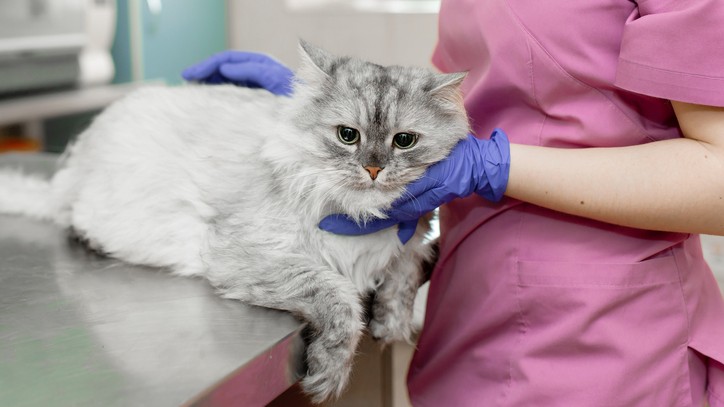
Looking for the best pet insurance for pre-existing conditions is not an easy task. Most standard insurance companies won't cover poorly pets and that's understandable given how much money they would end up paying for treatment.
Although it's frustrating, the bottom line is that pets with pre-existing conditions are a far higher financial risk for insurers so, in general, the best you're going to get is insurance that covers everything except the illnesses that you will have to declare.
It means you will be liable for the full cost of treatments and consultations related to those non-covered areas. There is also a risk that an insurance company may think an ailment not listed as a pre-existing condition is nevertheless related and refuse to pay for that one too.
Yet there is a glimmer of hope. Some insurance companies will cover your pet for a pre-existing condition if the ailment has not been an issue for a long time. In some cases, they'll go a little further and specify that you can't treat that condition for a set period after taking out cover.
Your pet will also be covered if a new condition emerges after a policy begins, even at the time of renewal. Just think very carefully about switching to a new provider in this instance because another insurance company is going to view that as a pre-existing condition.
The situation can also be different if your pet has an hereditary condition – that is, those typically associated with a particular breed. In this instance, an insurance company is more likely to charge you extra for a policy rather than refuse to cover the condition. Just take the policy out as soon as you can before any problems emerge.
So what about the cost? Well, there's no way around this. If you do manage to get cover for a pre-existing condition then it's going to be pricey. In general, you could be forking out as much as three times the cost of a regular policy but much depends on what the pre-existing condition is. Let's take a look at your options.
- Find the best pet insurance: Ensure your animal companion has proper protection
- How to get cheaper pet insurance: lower insurance costs for all of your pets
- Seven reasons to get your pet insured with the best policy possible – a vet’s view


Bought By Many: Best overall
Our expert review:
Specifications
Reasons to buy
Reasons to avoid
Bought By Many, launched in 2017, was founded specifically to offer animal owners the type of insurance cover they couldn't find elsewhere. For example, they offer a very generous lifetime policy in the form of the Complete plan, which covers £15,000 of vets fees, includes dental treatment, and offers monthly payments with no interest charges on top. There's also a Bought By Many MoneyBack policy, which refunds 20% of your premium every year you don't need to make a claim.
You're spoiled for choice with Bought By Many, as every one of the company's policies covers pre-existing conditions, providing no treatment for them has been given in the past two years.
For more recent ailments the company offers a specific 'Pre-existing' policy. You're eligible as long as your pet has not received any treatment for the three months prior to taking out the policy, and Bought By Many has made it work by scaling up the cover you'll be eligible to claim over time.
In the first year those pre-existing conditions will be offered £500 of cover (with all new conditions covered by £7,000 of lifetime vet fee cover); in year two, that number goes up to £1,000. In year three, if you have not made a claim on pre-existing conditions, the claim amount gets upped to the full £7,000. If you do make a claim in the first two years, the limit drops back down to £500.
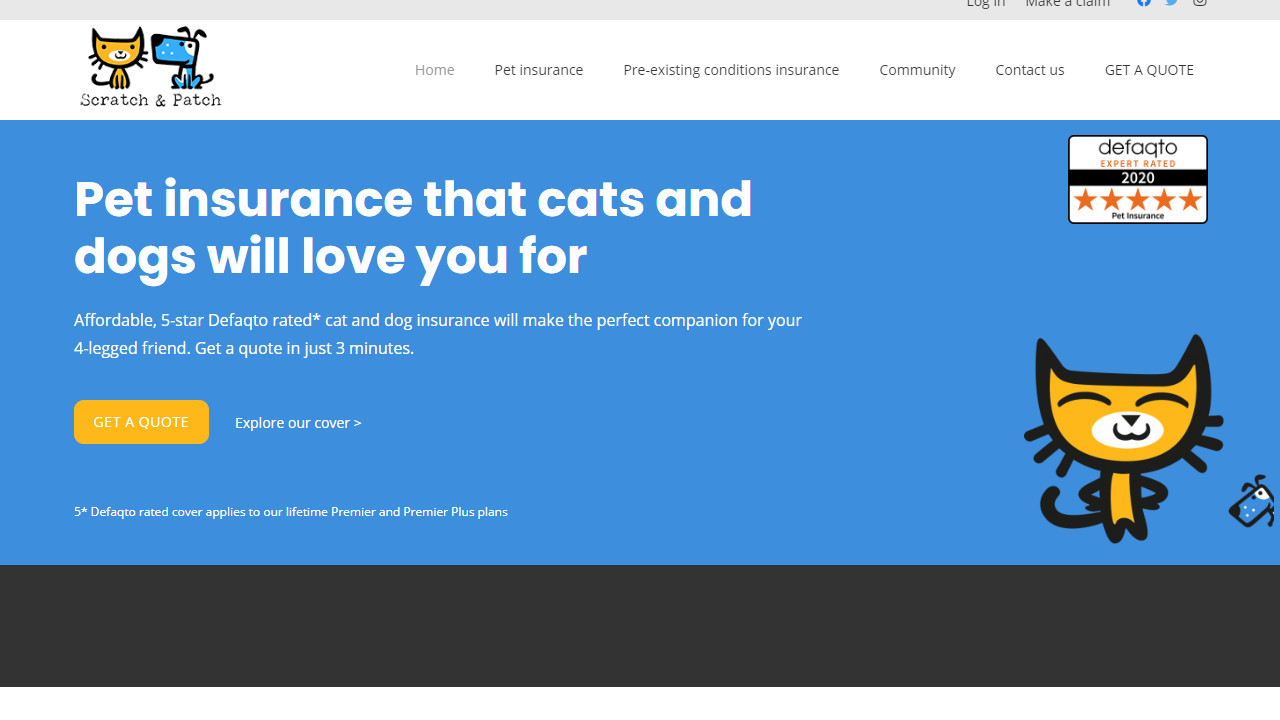

Scratch & Patch: Best for levels of cover
Our expert review:
Specifications
Reasons to buy
Reasons to avoid
Whether you can get pre-existing cover on Scratch & Patch's Champ plans really depends on the specifics of your pet's medical history. The company has so far provided cover for pets with a long list of medical ailments, but you'll need to fill in an online medical screening before you'll be told whether your pet's specific case is one they're happy to cover. Having an extensive knowledge of your pet's health before the policy begins is what the company says allows them to cover a wide range of things not cared for elsewhere.
Naturally, there's a slight penalty if you do get that cover, with paid vets fees reduced significantly on known conditions, although this generally won't affect your yearly cover limit for other treatments. You'll want to make sure you haven't kept anything secret from your vet, because there's obviously going to be a little cross checking going on when it comes to paying out. Scratch & Patch may also choose to not cover all of your pet's conditions. Again, it's a question of specifics.
The Champ plans offer three levels of cover, ranging from £2,500 fees up to £8,000 per year, and Scratch & Patch is willing to waive the usual post-purchase waiting period on the policy provided you're transferring from another provider.
Assistance dogs can get the cover, and there are no cat breeds excluded, though there's the usual list of excluded dogs. Professional dogs – racing dogs, gun dogs, beaters, and guard dogs – aren't eligible for the policy.
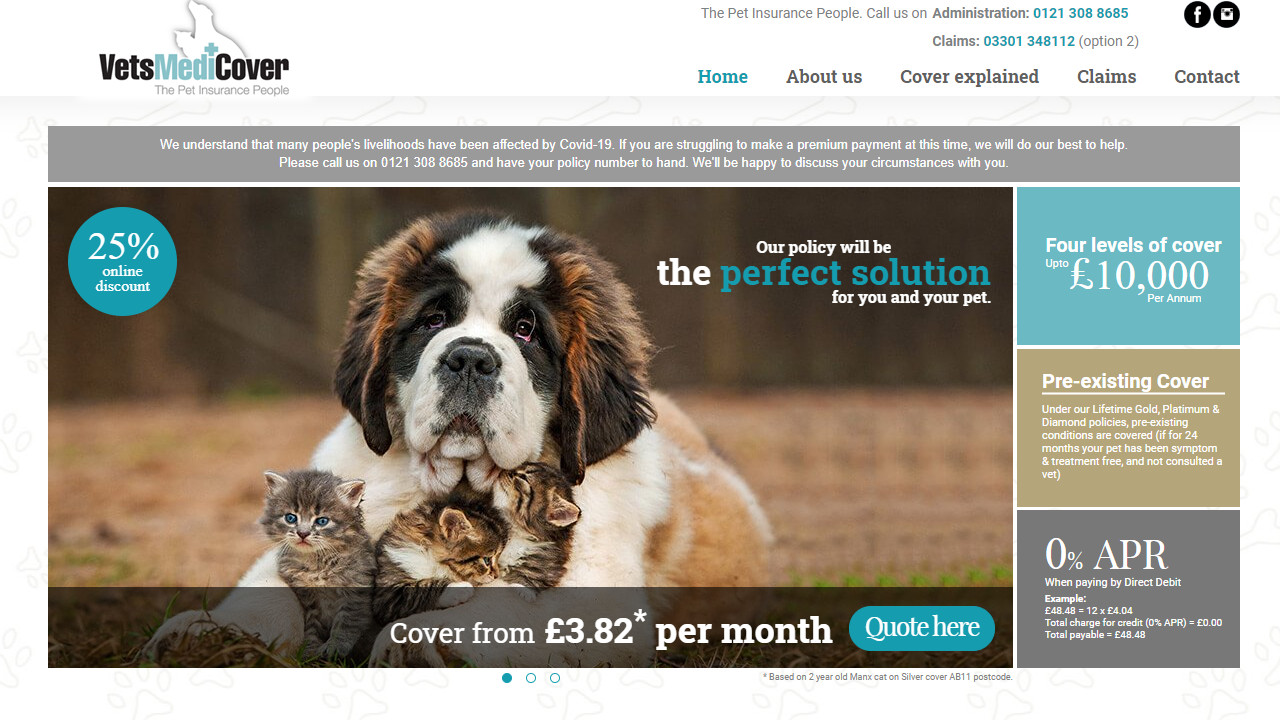

VetsMediCover: Best for low excess
Our expert review:
Specifications
Reasons to buy
Reasons to avoid
There are a number of things covered by VetsMediCover's range of policies which may or may not interest you, like providing £750 yearly cover for alternative and complementary medicine. Probably more interesting in this context is the cover for hereditary and congenital defects, included as standard with both its 12-month and lifetime policies.
If your pet has suffered from conditions in the past, you'll absolutely want to look at lifetime cover. As long as they've been symptom and treatment free for the previous 24 months, and are between eight weeks and eight years old (five years for certain breeds) VetsMediCover will offer you comprehensive cover, with no cover given for those known conditions for two years from the start of the policy.
In all other respects VetsMediCover offers fairly standard cover, only excluding new illnesses which occur two weeks after the start of the policy or injury within five days. Certain dog breeds are excluded – the likes of Staffies, Pits, and any Wolfhound or Wolf hybrid – and the policies don't cover working, guarding or racing dogs, but all other pets should be eligible.
How much is offered depends on the policy you plump for; the Diamond lifetime policy covers up to £10,000 of vets fees, and offers 40% of the cost of prescription food up to £200. All policies have a standard excess of £90 which, depending on the conditions that befall your pet in the future, seems like a pretty reasonable amount.


Lifetime Pet Cover: Best for older dogs
Our expert review:
Specifications
Reasons to buy
Reasons to avoid
Lifetime, like many others, is happy to offer insurance for pets with pre-existing conditions, but specifically excludes cover for these from its schedule. The difference here is how the company defines a pre-existing condition: if your pet has recovered to the point that it can be said to have no underlying weakness or susceptibility to future problems, and has not had treatment or any vet consultations regarding that condition for the past 24 months, Lifetime will write it off and offer coverage as normal. Chronic conditions won't be eligible.
What's especially handy is that Lifetime has no upper age limit on its policies, so if you have an older pet that has had health problems in the past and want to make sure they live out the rest of their lives in comfort, Lifetime may be able to offer a policy which suits.
For dogs, particularly larger breeds or those which frequently suffer from hereditary conditions, you may not have any luck getting a policy with Lifetime, as its list of excluded breeds is one of the longest out there. You may also find Lifetime to be one of the more expensive insurers, particularly if your pet does fall into that older category, and it does not offer quite as many fringe benefits as some other insurers. There's no euthanasia cover, for example, and no vet helpline. Older pets will also leave you liable for a co-payment on vet bills on top of your excess.
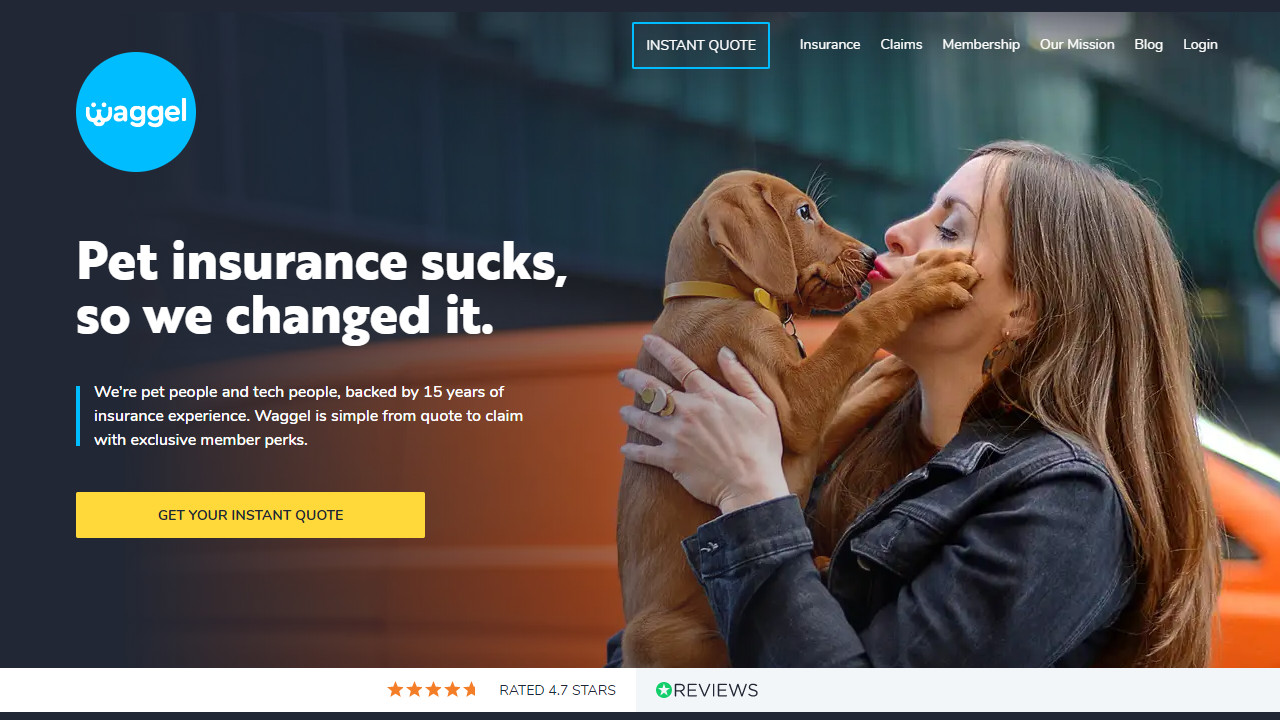

Waggel: Best for claim tracking
Our expert review:
Specifications
Reasons to buy
Reasons to avoid
It's important to point out that Waggel won't actually offer you any compensation if your pet's existing conditions flare up. This is not for getting cover for those conditions. That's not the point. The company just won't ask any questions about pre-existing conditions when you take out the policy. Its policy document states as much: "You don’t have to declare your existing conditions upfront. Upon your first claim we will request all of [your pet's] medical records and will let you know what conditions will be excluded."
Depending on the policy level you opt for, Waggel will cover between £1,000 and £10,000 of all vets fees covering eligible illnesses or conditions; from this overall coverage, there's a £1,000 limit for each complementary treatment, behavioral treatments or dental issues caused by accident or illness. There's also a £1,000 limit on cover for the theft or stray of your pet, a £1,000 payment for death by accident or illness, and a very generous £2,000,000 third party liability for the absolute worst case legal scenario.
While Waggel's standard policy will cover ongoing illness costs for conditions your pet develops after the policy is taken out, its list of excluded breeds is a little longer than some others, and includes a few specific cat breeds too. You do get fringe benefits, though: Waggel is proud of its claims process, which lets you see precisely where your claim is at any time, and links you with a specific claims advisor so your experience is as streamlined as possible.


PetGuard: Best for working dogs
Our expert review:
Specifications
Reasons to buy
Reasons to avoid
Like many other insurers, PetGuard will not actively offer any compensation for pre-existing conditions, or those which manifest within 14 days of the policy being taken out. But it is happy to offer you a policy for the rest of your pet's health needs, and if you're prepared to cover pre-existing conditions yourself you may find you end up with a reasonably good deal here.
What's most unusual is that PetGuard is also happy to cover working dogs. That includes therapy and assistance dogs, as well as those used for shooting, hunting, or livestock work, but not guard dogs or racing dogs. The company will also cover older pets, with £100 plus a 20% co-payment due for treatments if your pet is over eight years old. There's a 14-day grace period between taking out the policy and being able to make a claim.
If you own a breed which is susceptible to BOAS (Brachycephalic Obstructive Airway Syndrome), such as a French Bulldog or Pug, PetGuard will likely offer you continuing cover for it, but only if it has not manifested by the time the policy is taken out – that's a common thread, isn't it? The specific list of breeds covered under PetGuard's comprehensive policy excludes the usual list of dangerous dogs, and its third-party policy excludes even more, but the company is more than happy to offer policies for cross-breeds as long as they aren't mixed with any of the dog breeds on the list.
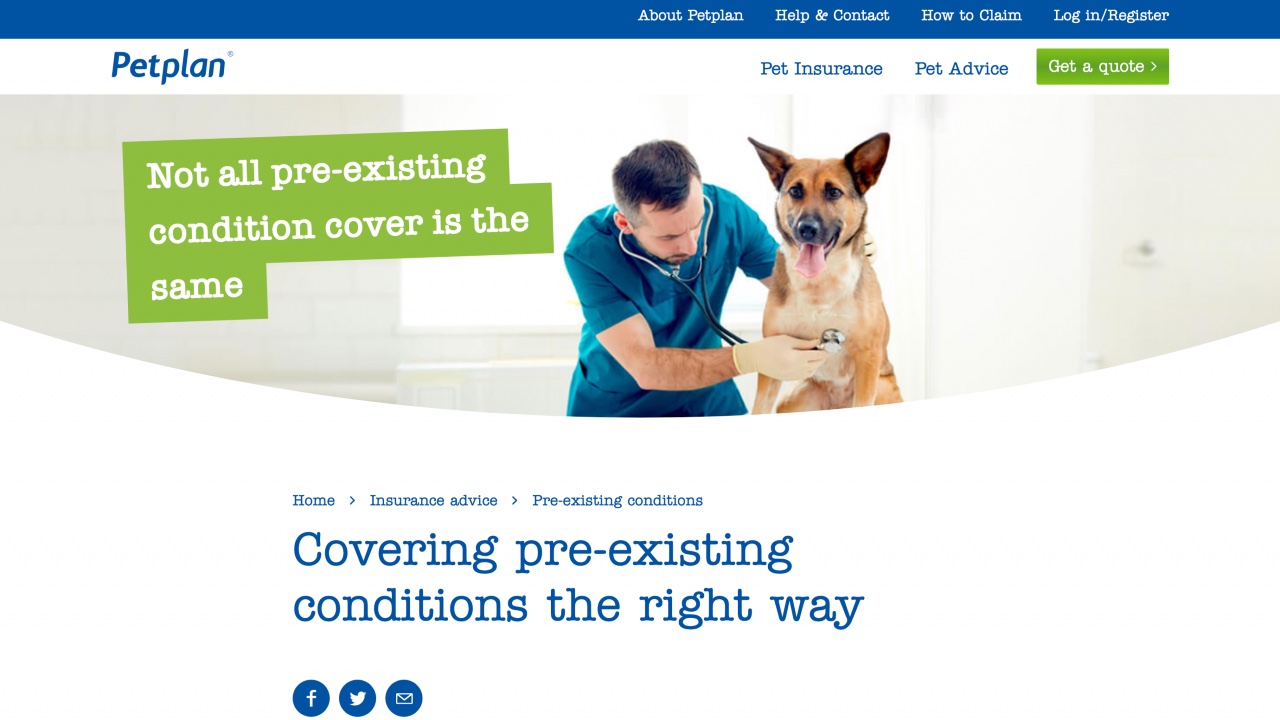
Petplan
Our expert review:
Specifications
Reasons to buy
Reasons to avoid
Petplan seeks to be flexible. It doesn't turn pets away with pre-existing conditions without first establishing what they are and how costly they are likely to be to treat. Indeed, as it clearly states, the insurer does not believe in a “one size fits all” approach and so it will review pets on a case-by-case basis. In doing so, it will establish how long it has been since your pet has suffered an ailment and, if it is in a position to offer a policy, then the pre-existing condition will receive full cover up a chosen veterinary fee.
It seems to be a fair way of working both in the interest of the insurer and the pet owner. We like how it will provide cover for a pre-existing condition that returns after it appears to have been resolved. But, like most insurers, it's not going to cover a condition that will affect a pet for the rest of its life. Insurance companies are not stupid and doing so is only going to mean shelling out huge sums – nobody could, in reality, expect that.
What Petplan will do, though, is clearly state everything is included and excluded in a policy upfront so there is no ambiguity. It's not going to be a case of discovering a condition isn't included at the time of making a claim – assuming you've ready the policy document, anyway. You also have a choice of policies: one that covers for life and another that is time limited. The major downside is that the policies are only available in the United Kingdom where it's the number one insurer.
How to choose animal insurance for pre-existing conditions
Why you can trust PetsRadar
This may be a case of shutting the stable door after the horse has bolted, and it's likely that you're reading this guide because your pet has already developed a condition, but the best way to insure your pet come what may is by taking out a lifetime policy when they are young. These, provided you stick with the same insurer, will generally cover absolutely any ailment or condition your pet might develop over the course of their lives, and the ongoing costs associated with those conditions. Note that you may still be charged a little extra for hereditary conditions related to your pet's breed.
If it's too late for that, every insurer has a different schedule of conditions and illnesses they are willing to cover. While we've broken down some of the best options, it's important to check policy documents and different providers before you take out insurance to ensure that everything important is covered.
Speak to insurers too, to see what they might be able to offer outside of any published schedules. If you've done your due diligence, and can talk through your comparisons, it's possible (if not likely) that you may be able to talk them into a better deal.
Be prepared to buy into a policy which does not cover that pre-existing condition at all. Things will get expensive, but at least a narrower policy will go some way to ensuring any other maladies your pet develops are properly paid for, so you're only on the hook for one recurring problem and not several.
Get the best advice, tips and top tech for your beloved Pets
Alex is a freelance writer, editor and sub editor specialising in entertainment and technology; he is a father of two, and owned by three increasingly grumpy cats. Somehow he has been doing this for 24 years, and it's still fun. He specialises in technology-related subjects, with a focus on smart home and gadgets and is a regular contributor to T3.com, TechRadar, PC Gamer, and more.

